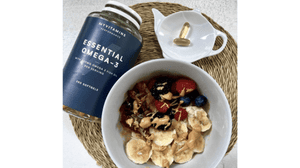
Vitamins and minerals are essential to joint strength and flexibility. Supplements are a great way to top up your levels, but with hundreds on the market, it can be difficult to know where to start. Here’s our guide to the top supplements for joints.
Why Is Joint Health Important?
Joints are parts of the body where bones meet. Without healthy joints, we can struggle to move freely and can suffer from stiffness and pain.
Why Do We Need Supplements For Our Joints?
Nutrition plays an important part in our bone, muscle and ligament health. For days when we don't eat a balanced diet, supplements can help to support our levels of vitamins and minerals.
Here are the best supplements for our joints:
Calcium
Vitamin D
Vitamin K
Collagen
Omega 3
Curcumin
Glucosamine HCL
Magnesium
Calcium
Calcium is needed in our diets for strong bones and muscle control. It's especially beneficial for menopausal women, who are prone to bone loss that can result in osteoporosis. (1) If calcium levels in the blood become low, the body maintains levels by taking the mineral from bones.
Foods high in calcium include dairy products (milk, cheese, yoghurts,) and leafy greens.
Myvitamins Calcium & Magnesium Tablets are an expert blend of essential minerals, with 800mg of calcium per serving. Simply take 3 tablets per day for 100% of your recommended daily calcium intake.
Vitamin D
Vitamin D is important for healthy bones and teeth and without it, we can't absorb calcium. (2) Vitamin D is formed naturally by the body using sunlight. This is why the NHS recommends daily supplementation of vitamin D in the darker months (October - March.)
With 62.5µg of vitamin D per serving, our Vitamin D Softgels are a convenient way to boost your intake each day.
Vitamin K
Vitamin K plays an important role in bone mineral density. Studies show that vitamin K impacts calcium balance, reducing fracture rates. 3
This nutrient is highest in green vegetables including kale, broccoli and and cabbage.
For a quick and convenient source of vitamin K, try our bestselling tablets.
Collagen
Collagen is an essential protein that's found naturally all over the body. Collagen provides our cartilage and bones with structure. Cartilage covers our joints and when it's healthy our bones are protected against movement. As we get older, our ability to make collagen declines and as a result our joints can weaken.
This protein is found in foods including bone broth, eggs and fish. If you don't want to eat bone broth everyday, supplements are a perfect option. Myvitamins Plant Collagen is a tasty vegan alternative for those following a plant-based diet.
Vitamin C is important nutrient that helps to promote normal collagen formation. (4) Our Joint Capsules contain 100mg of vitamin C per serving, making them a great addition to your wellness routine.
Omega 3
Omega 3 contains fatty acids DHA and EPA which help to support normal blood pressure levels and maintain brain health. DHA and EPA have also been shown to benefit arthritis and reduce inflammation in joints. 5
We can source omega 3 fatty acids from oily fish including mackerel and salmon. Supplements including Omega 3 Plus and Cod Liver Oil Softgels are ideal for topping up your intake anywhere, anytime. Our Cod Liver Oil Softgels contain added vitamin D, an essential nutrient for healthy bones and joints.
Curcumin
Curcumin is an active compound found in turmeric. As a polyphenol, curcumin has antioxidant benefits and has been linked to various health benefits around inflammatory conditions. 6
Myvitamins Curcumin & Vitamin D3 Capsules are a powerful combination of 50mg of curcumin and 11 µg of vitamin D (per serving,) designed to promote healthy bones and joints from within. 2
Glucosamine HCL
Glucosamine and chondroitin are structural components of cartilage that are made naturally in the body. Without strong cartilage, our joints aren't cushioned during movement and this can cause damage.
A recent study tested micronutrients against osteoarthritis. These nutrients included glucosamine sulfate, chondroitin sulfate, hyaluronic acid, collagen hydrolysate and omega 3 fatty acids. Osteoarthritis is a degenerative joint disease that impacts cartilage loss. The results showed that these nutrients had a promising impact on OA. They are able to 'slow the progression of cartilage destruction and may help to regenerate the joint structure, leading to reduced pain and increased mobility of the affected joint.' 7
There are no natural sources of glucosamine in food, other than in shellfish. Supplements can help to restore the levels lost over time. This is especially effective if you're regularly putting strain on your joints through high-intensity exercise.
Magnesium
Magnesium has various roles in the body including protecting bones and supporting muscle function, both of which are essential for joint health. (8) Foods that ae high in magnesium include nuts, wholegrains and green vegetables.
For a high-quality source of two important minerals, try Myvitamins Zinc & Magnesium Capsules.
Take Home Message
When our joints are weak, our movement and ability to exercise is limited, often causing pain. Out diet is is a vital part of joint health and without vitamins and minerals we can't feel our best. Supplements are a great way to fit more nutrients into your everyday routine, especially if you're on a busy schedule.
- Calcium is needed for the maintenance of normal bones. Calcium and vitamin D help to reduce the loss of bone mineral in post-menopausal women.
- Vitamin D contributes to the maintenance of normal bones.
- Vitamin K contributes to the maintenance of normal bones. https://pubmed.ncbi.nlm.nih.gov/11684396/
- Vitamin C contributes to normal collagen formation for the normal function of cartilage.
- https://www.ncbi.nlm.nih.gov/pmc/articles/PMC3575932/
- https://www.ncbi.nlm.nih.gov/pmc/articles/PMC5664031/
- https://www.ncbi.nlm.nih.gov/pmc/articles/PMC3150191/
- Magnesium contributes to normal muscle function and bone health.









